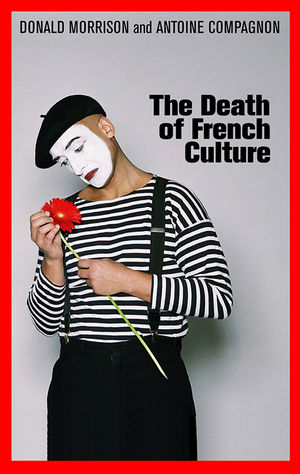The Death of French CultureISBN: 978-0-7456-4993-1
Hardcover
200 pages
August 2010, Polity
 Other Available Formats: Paperback
|
||||||
For a long time, France and its culture have been one and the same.
The greatness of the former added to the influence of the latter,
and vice versa. French writers, artists and philosophers were at
the centre of the world’s attention and enjoyed unparalleled
prestige. Of this past glory, all that is left today is
navel-gazing, nostalgia, and timidity. This was the disabused
verdict reached by Donald Morrison, an American in Paris, at the
conclusion his inquiry into the place of French culture in the
world. The creativity of its artists may be undeniable, but the
influence (ghostlike) and the importance (derisory) of France in
cultural exchanges both go to show that French culture no longer
speaks to the world. This decline ultimately suits the French
national mentality, inclined as it is to lamentation and
sorrow.
When Morrison originally published this piercing verdict on contemporary French culture in Time magazine in November 2007, it caused a sensation. Morrison was pilloried by the French press and attacked in countless newspapers, magazines and blogs. Morrison’s article gave rise to an extended interrogation of French culture by admirers and critics alike.
Undeterred by the controversy, Morrison has returned to his original article to see how well his central arguments hold up in the light of the criticisms levelled at him. This new and updated version of his controversial text is accompanied by a thoughtful reply by Antoine Compagnon, who highlights a certain ambivalence within French culture, still capable of achieving the best but seemingly paralysed by its preoccupation with its own grandeur. This important exchange between Morrison and Compagnon will be of great interest to anyone concerned with French culture and its legacy in the world today.
When Morrison originally published this piercing verdict on contemporary French culture in Time magazine in November 2007, it caused a sensation. Morrison was pilloried by the French press and attacked in countless newspapers, magazines and blogs. Morrison’s article gave rise to an extended interrogation of French culture by admirers and critics alike.
Undeterred by the controversy, Morrison has returned to his original article to see how well his central arguments hold up in the light of the criticisms levelled at him. This new and updated version of his controversial text is accompanied by a thoughtful reply by Antoine Compagnon, who highlights a certain ambivalence within French culture, still capable of achieving the best but seemingly paralysed by its preoccupation with its own grandeur. This important exchange between Morrison and Compagnon will be of great interest to anyone concerned with French culture and its legacy in the world today.



